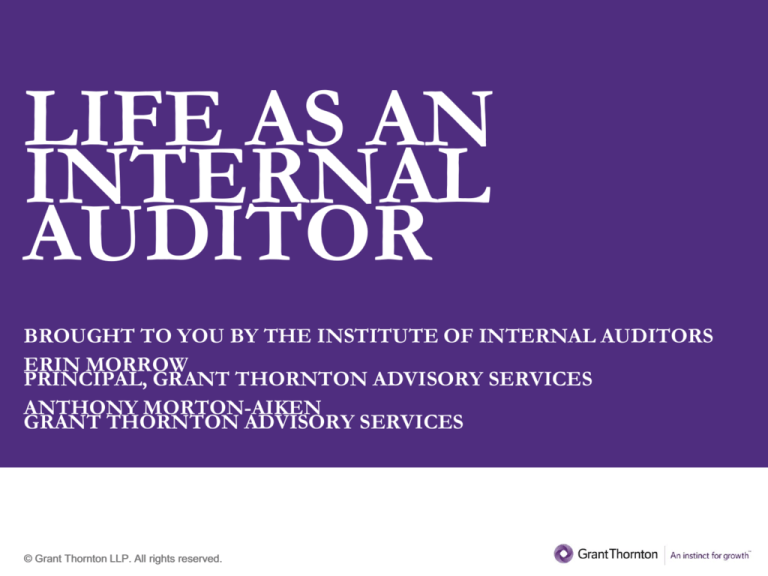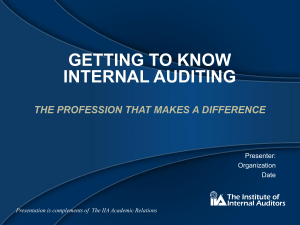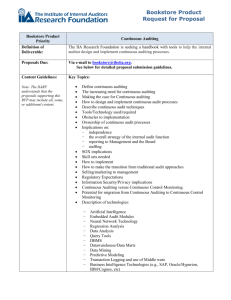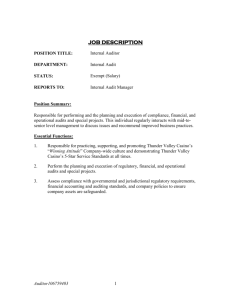
LIFE AS AN
INTERNAL
AUDITOR
BROUGHT TO YOU BY THE INSTITUTE OF INTERNAL AUDITORS
ERIN MORROW
PRINCIPAL, GRANT THORNTON ADVISORY SERVICES
ANTHONY MORTON-AIKEN
GRANT THORNTON ADVISORY SERVICES
© Grant Thornton LLP. All rights reserved.
INTRODUCTIONS
• Erin Morrow
– Principal, Business Advisory Services - New York
• Anthony Morton-Aiken
– Manager, Business Advisory Services - Boston
© Grant Thornton LLP. All rights reserved.
2
INTERNAL
AUDIT:
BASICS
INTERNAL AUDIT BASICS
DEFINITION (IIA)
• Internal auditing is an independent, objective
assurance and consulting activity designed to
add value and improve an organization's
operations.
• It helps an organization accomplish its objectives
by bringing a systematic, disciplined approach
to evaluate and improve the effectiveness of risk
management, control, and governance
processes.*
*Institute of Internal Auditors
http://www.theiia.org/theiia/about-the-profession/internal-audit-faqs/?i=1077
© Grant Thornton LLP. All rights reserved.
4
INTERNAL AUDIT BASICS
DEFINITION (IIA)
• Internal auditing is an independent, objective
assurance and consulting activity designed to
add value and improve an organization's
operations.
• It helps an organization accomplish its objectives
by bringing a systematic, disciplined approach
to evaluate and improve the effectiveness of risk
management, control, and governance
processes.*
*Institute of Internal Auditors
http://www.theiia.org/theiia/about-the-profession/internal-audit-faqs/?i=1077
© Grant Thornton LLP. All rights reserved.
5
INTERNAL AUDIT BASICS
DEFINITION (IIA)
• Internal auditing is an independent, objective
INTERNAL
assurance and consulting activity designed to
You perform audits internally within the
add value and improve
an organization's
company
operations. You are part of the organization and act as a
department within the company as opposed
• It helps an organization
accomplish its objectives
to external audit where you are an external
entity disciplined approach
by bringing a systematic,
to evaluate and improve the effectiveness of risk
management, control, and governance
processes.*
*Institute of Internal Auditors
http://www.theiia.org/theiia/about-the-profession/internal-audit-faqs/?i=1077
© Grant Thornton LLP. All rights reserved.
6
INTERNAL AUDIT BASICS
DEFINITION (IIA)
• Internal auditing is an independent, objective
assurance and consulting activity designed to
add value and improve an organization's
operations.
• It helps an organization accomplish its objectives
by bringing a systematic, disciplined approach
to evaluate and improve the effectiveness of risk
management, control, and governance
processes.*
*Institute of Internal Auditors
http://www.theiia.org/theiia/about-the-profession/internal-audit-faqs/?i=1077
© Grant Thornton LLP. All rights reserved.
7
INTERNAL AUDIT BASICS
DEFINITION (IIA)
• Internal auditing is an independent, objective
assurance
and consulting
designed to
Independent:
Not involved in the activity
activity
review. Not part of the management
add valueunder
and
improve an organization's
hierarchy.
operations.
Objective: Objectivity is a state of mind, it
depend on your boss.
Opinions
• It helps andoesn’t
organization
accomplish
its objectives
should be based on verifiable facts, viewed
bias.
by bringingwithout
a systematic,
disciplined approach
to evaluate and improve the effectiveness of risk
management, control, and governance
processes.*
*Institute of Internal Auditors
http://www.theiia.org/theiia/about-the-profession/internal-audit-faqs/?i=1077
© Grant Thornton LLP. All rights reserved.
8
INTERNAL AUDIT BASICS
DEFINITION (IIA)
• Internal auditing is an independent, objective
assurance and consulting activity designed to
add value and improve an organization's
operations.
• It helps an organization accomplish its objectives
by bringing a systematic, disciplined approach
to evaluate and improve the effectiveness of risk
management, control, and governance
processes.*
*Institute of Internal Auditors
http://www.theiia.org/theiia/about-the-profession/internal-audit-faqs/?i=1077
© Grant Thornton LLP. All rights reserved.
9
INTERNAL AUDIT BASICS
DEFINITION (IIA)
• Internal auditing is an independent, objective
assurance
and consulting activity designed to
Assurance: To inform the management, and
through
them
the stakeholders,
controls
add value
and
improve
an that
organization's
are operating as expected.
operations.
Consulting Activity: Your role is to provide help
• It helps an
accomplish its objectives
and organization
guidance to your company.
by bringing a systematic, disciplined approach
to evaluate and improve the effectiveness of risk
management, control, and governance
processes.*
*Institute of Internal Auditors
http://www.theiia.org/theiia/about-the-profession/internal-audit-faqs/?i=1077
© Grant Thornton LLP. All rights reserved.
10
INTERNAL AUDIT BASICS
DEFINITION (IIA)
• Internal auditing is an independent, objective
assurance and consulting activity designed to
add value and improve an organization's
operations.
• It helps an organization accomplish its objectives
by bringing a systematic, disciplined approach
to evaluate and improve the effectiveness of risk
management, control, and governance
processes.*
*Institute of Internal Auditors
http://www.theiia.org/theiia/about-the-profession/internal-audit-faqs/?i=1077
© Grant Thornton LLP. All rights reserved.
11
INTERNAL AUDIT BASICS
DEFINITION (IIA)
• Internal auditing is an independent, objective
assurance
and consulting activity designed to
Systematic, disciplined approach:
add value and improve an organization's
Based on guidance issued by regulators,
operations.
professional certifications, and training
provided by your firm,
• It helps an organization accomplish its objectives
by bringing a systematic, disciplined approach
to evaluate and improve the effectiveness of risk
management, control, and governance
processes.*
*Institute of Internal Auditors
http://www.theiia.org/theiia/about-the-profession/internal-audit-faqs/?i=1077
© Grant Thornton LLP. All rights reserved.
12
INTERNAL AUDIT BASICS
DEFINITION (IIA)
• Internal auditing is an independent, objective
assurance and consulting activity designed to
add value and improve an organization's
operations.
• It helps an organization accomplish its objectives
by bringing a systematic, disciplined approach
to evaluate and improve the effectiveness of risk
management, control, and governance
processes.*
*Institute of Internal Auditors
http://www.theiia.org/theiia/about-the-profession/internal-audit-faqs/?i=1077
© Grant Thornton LLP. All rights reserved.
13
INTERNAL AUDIT BASICS
DEFINITION (IIA)
• Internal Risk
auditing
is an
independent,
objective
Management:
One of
the main roles of
Internal Audit is to help the company manage
assurance
and consulting activity designed to
their risks.
add value
and improve an organization's
Control: Internal Audit helps the company to
effectively manage and regulate their
operations.
business environment.
• It helps an
organization
accomplish
its
objectives
Governance: Governance deals with the
processes
and systems by which
an
by bringing
a systematic,
disciplined
approach
organization operates effectively
to evaluate and improve the effectiveness of risk
management, control, and governance
processes.*
*Institute of Internal Auditors
http://www.theiia.org/theiia/about-the-profession/internal-audit-faqs/?i=1077
© Grant Thornton LLP. All rights reserved.
14
HISTORY OF INTERNAL AUDIT
• 5000 years ago, in the Middle Kingdom of the Nile, the Pharaoh's deputy
was overseeing the storage of grains. Auditing was a matter of
reperforming the work of others. Auditing meant observing, counting and
double-checking records.
•
The processes and systems were very simple, and so was auditing.
• As the business organizations grew in size and complexity, the practice of
Internal Audit also evolved.
• The modern practice of auditing internal control systems replaced the prior
technique of reperforming every step
• Today, we use sophisticated risk modeling, statistical sampling, computer
assisted audit techniques, and customer-focused total quality management
as part of the audit process
© Grant Thornton LLP. All rights reserved.
15
INTERNAL AUDIT BASICS
PURPOSE
• the four cornerstones of effective corporate
governance are:
audit committee of the board of directors
executive management
external auditors
internal auditors
• When these groups work together with healthy
interdependence, internal controls are strong,
reporting is accurate, ethics are maintained,
oversight is effective, risks are mitigated, and
investments are protected.
From "INTERNAL AUDITING ALL IN A DAY’S WORK"
https://na.theiia.org/about-us/about-ia/Public%20Documents/06262_All_In_A_Days_Work-Rev.pdf
© Grant Thornton LLP. All rights reserved.
16
INTERNAL
AUDIT:
WHAT IS OUR ROLE
WHAT IS INTERNAL AUDIT’S ROLE
IN THE ORGANIZATION?
Board of Directors
Internal Audit
External Audit
Management
© Grant Thornton LLP. All rights reserved.
WHAT IS INTERNAL AUDIT’S ROLE
IN THE ORGANIZATION?
© Grant Thornton LLP. All rights reserved.
INTERNAL
AUDIT:
CAREER
OPPORTUNITIES
INTERNAL AUDIT
WHAT IS THE CAREER PATH?
Where do I
start?
Professional
Internal
Auditor
Is it really a
career?
© Grant Thornton LLP. All rights reserved.
• Broad range of degrees applicable
(financial, operational, social studies, etc.)
• Work experience in companies (most
experience is relevant)
• Join a Company / Government Department
(Directly into IA function, or through another role)
• Professional Services Firm (out-sourced IA)
(Big Four, Grant Thornton, Smaller Firms)
• Head of IA Department
• Other key management positions in the
company
• Partner in a professional services firm
21
INTERNAL AUDIT BASICS
WHAT IS INTERNAL AUDITING?
Communicating
Analyzing
with clarity and
opportunities
accuracy
Evaluating
WHAT IS
Examining
emerging
INTERNAL
global issues
technologies
AUDITING?
Assessing risks,
Assuring that controls
controls, ethics,
are adequate to
quality, economy,
mitigate the risks
and efficiency
© Grant Thornton LLP. All rights reserved.
22
INTERNAL
AUDIT:
NEED
DOES INTERNAL AUDIT HAVE TO EXIST?
© Grant Thornton LLP. All rights reserved.
24
DOES INTERNAL AUDIT HAVE TO EXIST?
• "WorldCom: Who's really gonna notice $9 billion dollars
anyway?"1
– What began as a routine internal audit, transformed into the discovery
of the largest accounting manipulation of all time.
– Worldcom, a leading telecommunications company built from over 70
acquisitions, found itself ranked at the top of its class for illegal and
creative accounting practices- Worldcom leaders successfully managed
to erode the company market value from $180 billion in 1999 to
approximately $350 million in 2002.
1. http://mba.tuck.dartmouth.edu/pages/faculty/syd.finkelstein/case_studies/03.html
© Grant Thornton LLP. All rights reserved.
25
DOES INTERNAL AUDIT HAVE TO EXIST?
"WorldCom: Who's really gonna notice $9 billion dollars anyway?"1.
•
In June of 2002, Cynthia Cooper, VP of Internal Audit,
uncovered suspicious capitalizing of line costs that had
been treated as expenses in prior years. By capitalizing
these expenses, Worldcom managed to "produce"
profits for five quarters that would have otherwise shown
loses.
•
Other fraudulent accounting practices were unveiled
going back to 1999. An additional $2 billion reserved for
bad debts was improperly used to boost operating
income.
•
Accounting manipulations included inflating profit-margin
figures by arbitrarily reducing line costs and maintaining
fake accounts on the accounts receivables books.
•
In total, Worldcom almost successfully misrepresented
profits by approximately $7 billion with an additional $2
billion in question.
2
1 .http://mba.tuck.dartmouth.edu/pages/faculty/syd.finkelstein/case_studies/03.html
2. http://money.cnn.com/2005/03/15/news/newsmakers/ebbers/
© Grant Thornton LLP. All rights reserved.
26
INTERNAL AUDITOR BASICS
WHO ARE INTERNAL AUDITORS?
• internal auditors are key to an organization’s
success in today’s business world
• professionals with an in-depth understanding of the
business culture, systems, and processes
• diversity of knowledge gives internal auditors a
broad perspective on the organization
• education and expertise can differ broadly. They
come from diverse areas such as engineering,
operations, finance, and information technology
© Grant Thornton LLP. All rights reserved.
27
INTERNAL
AUDIT:
WHO WE ARE &
WHAT WE DO
INTERNAL AUDITOR BASICS
WHO ARE INTERNAL AUDITORS?
• a valuable resource to executive management and
boards of directors in accomplishing overall goals
and objectives, as well as in strengthening internal
controls and organizational governance
• provide objective, independent, professional
advice to management and strive for continuous
improvement
• have extensive knowledge of computer systems
and the Internet, regardless of background or
industry
© Grant Thornton LLP. All rights reserved.
29
HOW DOES INTERNAL AUDIT
DECIDE WHAT TO AUDIT?
1
2
Risk
Identification
Develop risk
universe by first
identifying
organization’s goals
and objectives, and
then leveraging
external thought
leadership and prior
audit experience to
identify risks to
achieving goals
3
Validation
Prioritization
Validate relevance
of risk universe
through a
combination of data
analytics and
qualitative input
from management
Rank risks
according to
likelihood and
impact, taking into
account such
considerations as
prior audit findings,
organizational
changes, and
linkage to key
strategic initiatives
© Grant Thornton LLP. All rights reserved.
4
Mapping
Map top risks to
relevant ‘auditable
entities’, this may
be a particular
organization,
project, or crossfunctional process
5
Develop
Audit
Plan
Develop audit plan
to evaluate process
and controls for
auditable entities
linked to key risks
30
INTERNAL AUDIT
WHAT DO WE DO?
Business Process Audits
• Operational Audits
• Determining if resources are being used effectively and efficiently to
fulfill the organization's mission and objectives
• Financial Audits
• Reviewing accounting /financial transactions accuracy and proper
treatment.
• Compliance Audits
• Determining if entities are complying with applicable laws, regulations,
policies and procedures
• Internal Control Reviews
• Review of operation and adequacy of controls around major business
functions (i.e. payroll, accounts payable and financial reporting)
© Grant Thornton LLP. All rights reserved.
31
INTERNAL AUDIT
WHAT DO WE DO?
Information Technology Audits
• Penetration/Network Vulnerability Testing
• Evaluating security of a system using proprietary tools used to
identify exploits and vulnerabilities
• Database Audits
• Monitoring and analyzing a DB for authorization and
authentication issues
• Application/Automated Controls Audit
• Evaluating an organization's systems, practices, and operations
• Ethical Hacking Audits
• Simulated hacker attack to break into systems/networks to identify
and exploit security flaws
© Grant Thornton LLP. All rights reserved.
32
INTERNAL AUDIT MANAGEMENT &
CHALLENGES
What are some factors to consider when
conducting an internal audit?
• Stakeholders expectations
• People
• Financials
• Regulatory requirements
• Communication
• Timeliness
© Grant Thornton LLP. All rights reserved.
33
INTERNAL
AUDIT:
CHALLENGES
INTERNAL AUDIT MANAGEMENT &
CHALLENGES
What are some challenges of internal auditing?
• Prioritization of Audits
• Skill / Knowledge Requirements
• Regulatory Requirements
• Corporate/Management Buy-in
• Staffing / Resources
© Grant Thornton LLP. All rights reserved.
35
INTERNAL
AUDIT:
CERTIFICATIONS &
ASSOCIATIONS
CERTIFICATION PROGRAMS
• Certified Internal Auditor (CIA)
• Certified Public Accountant (CPA)
• Certified Information Systems Auditor (CISA)
• Certified Fraud Examiner (CFE)
• Certified Government Auditing Professional (CGAP)
• Certified Financial Services Auditor (CFSA)
© Grant Thornton LLP. All rights reserved.
37
PROFESSIONAL ASSOCIATIONS
• Institute of Internal Auditors (IIA)
• Association of Certified Public Accountants (AICPA)
• Information Systems and Control Association (ISACA)
• Association of Certified Fraud Examiners (ACFE)
© Grant Thornton LLP. All rights reserved.
38
INTERNAL
AUDIT:
IS IT FOR YOU?
INTERNAL AUDIT
WHAT'S IN IT FOR YOU?
• Work with multiple clients in
diverse industries
• Not locked into a specific audit
area/function
• Exposure to different methods
and approaches to auditing
• Exposure to high level
executives and audit committee
members
• You perform your work from
various locations – not stuck in
the same office
© Grant Thornton LLP. All rights reserved.
• Possibility to obtain multiple
certifications (i.e., CIA, CISA,
etc.)
• Travel to fun/exciting
locations
• Premier status on multiple
airlines and with multiple hotels
• A ton of frequent flier miles and
hotel points (free vacations)
40
INTERNAL AUDIT
WHAT'S THE CATCH?
• Frequent change in work type
and subject matter
• Hard schedules/deadlines (get
in, get out)
• Accountable for every hour of
work day (i.e., bill clients by the
hour)
• Challenging work environment
• Work with and for different
people throughout the year
• Often work and travel alone
© Grant Thornton LLP. All rights reserved.
• Required to maintain multiple
certifications (i.e., CIA, CISA,
CPA, etc.)
• Required training and firm
policy compliance
• Travel to small locations with
little to do in the evenings.
• The hotel staff knows your
name and family history.
• Staying at home is a "fun"
vacation.
41
Internal Audit
WHAT ARE THE KEYS TO SUCCESS?
Be comfortable with being uncomfortable.
Learn from those around you and above you.
Find the learning opportunity in every mistake you make.
Ask questions!
© Grant Thornton LLP. All rights reserved.
42
QUESTIONS
© Grant Thornton LLP. All rights reserved.
43
This presentation is the work of Grant Thornton LLP, the U.S. member firm of Grant Thornton International Ltd, and is in all respects subject to negotiation, agreement and
signing of specific contracts. The information contained within this document is intended only for the entity or person to which it is addressed and contains confidential
and/or proprietary material. Dissemination to third-parties, copying or use of this information is strictly prohibited without the prior written consent of Grant Thornton LLP.
© Grant Thornton LLP. All rights reserved.
44








